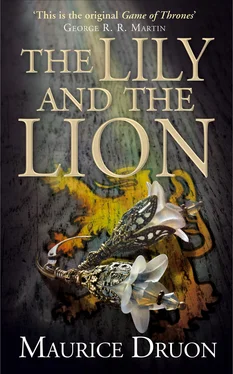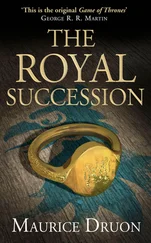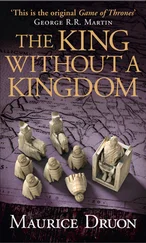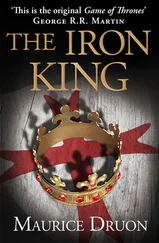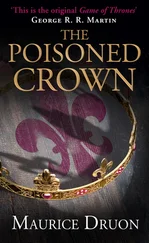He went to the window, and looked out at the cathedral and its two asymmetrical, fretted towers. The sun was shining at an angle on the great rose window. The bells were still pealing and drowning the noise of the crowd.
The Duke of Brittany, followed by his suite, was mounting the steps to the central porch.
Twenty yards behind him, the lame Duke of Bourbon followed, two pages carrying the train of his mantle.
Behind them again, came Mahaut of Artois’ retinue. She had good reason to walk with so firm a step today! Taller than most men, her face crimson, she was acknowledging the greetings of the people with slight but imperious inclinations of the head. There went a criminal, a liar, a poisoner of kings, and a thief who had stolen documents from the royal archives. And now, on the very point of confounding her, of being victorious at last, after twenty years of effort, he was going to be compelled to renounce his triumph. And why? Because a bishop’s concubine had lost a key!
Was there not justification for using base means against the base? Should one be over-nice about the means one employed to bring about the triumph of right?
And, after all, when you came to think of it, if Mahaut did possess the documents from the safe at Château d’Hirson – even if she had not immediately destroyed them, which she probably had – she could certainly never produce them or allude to their existence, since they were proof of her guilt. If similiar documents were produced in evidence against her, she would be caught. It was a pity he had not the whole day in front of him in which to think it over and get more information. He had to make his mind up within the hour, and entirely on his own.
‘I’ll see you again, woman; but not a word to anyone,’ he said.
Forgery was undoubtedly a serious risk.
He picked up his huge coronet and put it on his head. With a glance at the many mirrors that reflected him split into some thirty separate fragments, he set out for the cathedral.
‘A KING’S SON CANNOT kneel to a count’s son!’ said the sixteen-year-old Sovereign. He had thought of this formula entirely on his own, and insisted on it to his counsellors, so that they in turn should insist on it to the French jurisconsults.
‘Really, my Lord Orleton,’ said young King Edward III, when they arrived in Amiens, ‘last year you came over to maintain that I had a greater right to the throne of France than my cousin of Valois. Do you now suggest that I should throw myself to the ground at his feet?’
Like so many boys whose parents have lived dissolute and irregular lives, Edward III, now that he was on his own for the first time, was determined to act on sound and sensible principles. During his six days in Amiens, he had insisted that the whole question of the homage be reconsidered.
‘But my Lord Mortimer is most anxious to maintain peace with France,’ said John Maltravers.
‘My lord,’ Edward interrupted him, ‘you are here to guard me, I believe, not to advise.’
He could not conceal his dislike of the long-faced Baron who had been not only his father’s jailer but undoubtedly also his murderer. To have to submit to Maltravers’ surveillance and indeed his spying, for that was what it amounted to, annoyed Edward very much. He went on:
‘My Lord Mortimer is our great friend, but he is not the King, and it is not he who is to render homage. And my Lord Lancaster, who by virtue of presiding over the Council of Regency is alone in a position to take decisions in my name, gave me no instructions before I left as to the nature of the homage I should render. I refuse to render the homage of a liegeman.’
The Bishop of Lincoln, Henry de Burghersh, Chancellor of England, who was also of Mortimer’s party, but less under his thumb and certainly more intelligent than Maltravers, could not but approve the young King’s concern to defend his dignity and the interests of his realm, in spite of the difficulties it created.
For not only did the homage of a liegeman oblige the vassal to present himself with neither arms nor crown, but also to take the oath on his knees, which implied that the vassal was, as his first duty, the suzerain’s man.
‘As his first duty,’ Edward emphasized, ‘and therefore, my lords, if it so happened that, while we were making war in Scotland, the King of France summoned me to a war of his own in Flanders, Lombardy or elsewhere, I should have to abandon everything to join him, failing which he would have the right to seize my duchy. I cannot have that.’
Lord Montacute, who was one of the barons of Edward’s suite, developed a great admiration for his young sovereign’s precocious wisdom and no less precocious firmness. Montacute himself was twenty-eight.
‘I think we shall have a good king,’ he said. ‘It is a pleasure to serve him.’
From then on he was always by Edward’s side, lending him counsel and support.
In the end, the young King had his way. Philippe of Valois’ advisers also wanted peace and, above all, to bring the negotiations to a conclusion. The important thing was that the King of England had come. They had not assembled the whole kingdom and half Europe merely to afford them the spectacle of the negotiations ending in failure.
‘Very well, let him render merely simple homage,’ said Philippe VI to his chancellor, as if it were of no greater significance than a decision about some dance figure, or tournament entry. ‘I think he’s quite right; in his place, I should no doubt do the same.’
And so it was that Edward III advanced up the cathedral, which was packed with lords right into the side chapels, wearing his sword, his royal mantle, embroidered with leopards, which fell in long folds from his shoulders, and his crown. His fair eyelashes were lowered and excitement had enhanced the usual pallor of his face. The heavy adornments made his extreme youth all the more striking. He looked like an archangel; and all the women felt their hearts go out to him, indeed fell in love with him on the spot.
Two English bishops and ten barons walked behind him.
The King of France, his mantle embroidered with lilies, sat enthroned in the choir, a little higher than the kings, queens and sovereign princes about him, whose crowns formed a sort of pyramid. He rose with majestic courtesy to receive his vassal, who came to a halt three paces from him.
A great ray of sunlight was shining through a window and touching them as if it were a sword from Heaven.
Messire Mille de Noyers, the Chamberlain, a master of Parliament and a master of the Exchequer, stepped forward from the crowd of peers and great officers and took up his position between the two sovereigns. He was a grave-looking man of about sixty, who seemed not the least impressed either by his state robes or by the part assigned him. In a loud, clear voice he said: ‘Sire Edward, the King, our Master and most puissant Lord, does not receive you here in testimony of all the rights he holds by law in Gascony and Agenais, as King Charles IV held them by law, and which are not included in the homage.’
Then Henry de Burghersh, Edward’s chancellor, stepped forward to stand beside Mille de Noyers and replied: ‘Sire Philippe, our Lord and Master, the King of England, or any other for him or by him, renounces none of the rights he holds in the Duchy of Guyenne and its appurtenances, and declares that the King of France acquires no new rights whatsoever by this homage.’
These were the highly ambiguous formulas that had been agreed upon; they defined nothing, they settled nothing. Each word had a double meaning.
The French wanted it understood that the borderlands, which had been seized in the previous reign during the campaign commanded by Charles of Valois, were to remain directly attached to the Crown of France. This was a confirmation of the de facto position.
Читать дальше
